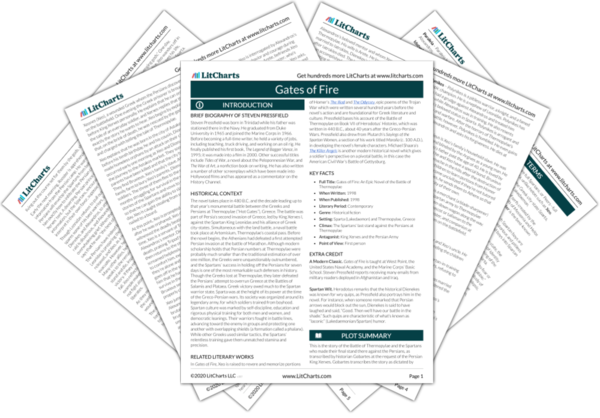Andreia Quotes in Gates of Fire
We talked for hours in secret on the pursuit of esoterike harmonia, that state of self-composure which the exercises of the phobologia are designed to produce. As a string of the kithera vibrates purely, emitting only that note of the musical scale which is its alone, so must the individual warrior shed all which is superfluous in his spirit, until he himself vibrates at that sole pitch which his individual daimon dictates. The achievement of this ideal, in Lakedaemon, carries beyond courage on the battlefield; it is considered the supreme embodiment of virtue, andreia, of a citizen and a man.
“Mankind as it is constituted,” Polynikes said, “is a boil and a canker […] Fortunately God in his mercy has provided a counterpoise to our species’ innate depravity. That gift, my young friend, is war.
War, not peace, produces virtue. War, not peace, purges vice. War, and preparation for war, call forth all that is noble and honorable in a man. It unites him with his brothers and binds them in selfless love, eradicating in the crucible of necessity all which is base and ignoble. There in the holy mill of murder the meanest of men may seek and find that part of himself, concealed beneath the corrupt, which shines forth brilliant and virtuous, worthy of honor before the gods. Do not despise war, my young friend, nor delude yourself that mercy and compassion are virtues superior to andreia, to manly valor.”
“Now consider, friends, that which we call women’s courage.
What could be more contrary to female nature, to motherhood, than to stand unmoved and unmoving as her sons march off to death? Must not every sinew of the mother’s flesh call out in agony and affront at such an outrage? Must not her heart seek to cry in its passion, ‘No! Not my son! Spare him!’ That women, from some source unknown to use, summon the will to conquer this their own deepest nature is, I believe, the reason we stand in awe of our mothers and sisters and wives. This, I believe, Dienekes, is the essence of women’s courage and why it, as you suggested, is superior to men’s.”












